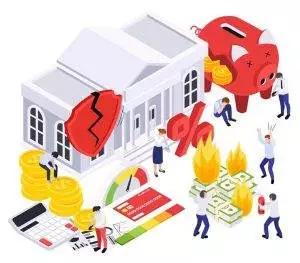There is a growing crisis of housing affordability in many areas of the country, resulting from a combination of rising mortgage rates and a shortage of homes. Unfortunately, this crisis may hurt your ability to save for retirement. Let’s take a closer look at how the housing crisis can affect your retirement savings.

According to a study conducted by the Joint Center for Housing Studies at Harvard University, the State of the Nation’s Housing 2023, it is expected that the monthly housing payments required to purchase a median-priced home will surpass $3,000 by March 2023. This includes property taxes, insurance, and mortgage expenses. Rising housing costs can significantly affect one’s ability to save for retirement. As monthly payments exceed the $3,000 threshold, it becomes increasingly difficult to allocate funds toward retirement savings. As a result, individuals may have fewer resources to contribute to their 401(k) or IRA accounts, hindering the growth of their nest egg. Furthermore, the housing shortage exacerbates the situation by increasing competition among buyers, leading to further price increases. This not only makes it difficult for potential homeowners to enter the market but also adds financial strain to those struggling to afford a home. Consequently, individuals may feel compelled to redirect funds from retirement savings to cover the escalating housing costs. Individuals need to be aware of these challenges and explore alternative strategies to secure their financial future amidst this housing crisis.
According to the survey, to purchase a property with an average price, you would need to earn a salary of $117,000. Due to the limited availability of homes and the elevated prices of those that are available, you may need to adjust your budget if you are in the market for a home. The housing crisis could have an impact on your retirement savings as you plan for the future. This may result in you realizing that:
– Less chance to accumulate long-term savings.
– Fewer chances to accumulate equity.
– Higher Cost of Living
– A greater amount of debt to repay.
Fewer chances to accumulate long-term savings
If a large part of your income is invested in your home, you will probably have a reduced amount of money accessible for retirement savings. This may require you to modify your lifestyle and live on a smaller budget after retirement. This could be disappointing, especially if it means limiting your travel or other interests.
If you’re looking for ways to reduce your current housing expenses, one option is to downsize to a smaller property or consider a fixer-upper that you can work on yourself. There are also housing programs and charitable organizations that provide opportunities for individuals and families to volunteer their time and help build or renovate affordable homes. This not only lowers housing costs but also gives you a sense of accomplishment for contributing to the availability of affordable housing. Let me know if you have any other questions or need any further assistance.
One effective way to boost your retirement savings is by taking on a second job, which could be a part-time or remote position. By saving the extra income, you can use it to make a down payment on a new property or invest it in a retirement account like an IRA. This approach helps you balance your desire to own a home with your need for long-term financial stability.
Fewer chances to increase equity
In areas where housing prices are affordable, it is possible for a worker to purchase a home and pay off the mortgage before retiring. This allows them to sell the property and buy a new one without any debt. Alternatively, they may choose to sell their home and move to a less expensive region in terms of property prices, property taxes, and homeowner association fees.
However, if housing values in the area are increasing rapidly, it may be difficult to implement this strategy. If you cannot afford to buy a house early on in your career, you may have to rent for a longer period of time. Delaying the purchase of a property until later in life may result in less time to pay off the mortgage before retirement. Moreover, long-term rental agreements may limit your ability to accumulate wealth that you can use in retirement.
Higher cost of living due to the Housing Crisis
If you are living in an area where housing prices are high, it is likely that the cost of food and entertainment will also be elevated. This can have a significant impact on your retirement budget, making it challenging to cover your monthly living expenses. In such a situation, it may be beneficial to consider a more affordable region if you have the flexibility to relocate.
Recently, I helped a client who was unable to afford housing in an expensive location. We explored different areas that fulfilled their requirements while being more budget-friendly. As a result, their monthly expenses decreased, allowing them to allocate more funds towards other necessities. This helped them continue saving for retirement while reducing their housing costs.
A greater amount of debt to repay
You might need a bigger mortgage than you anticipated if you choose to buy in an expensive neighborhood. Additionally, the debt can come with a higher interest rate.
It would be wise, if possible, to pay off a high-interest mortgage by making additional monthly payments or investing at least monthly into several good-quality mutual funds. Working toward paying off house debt could free up money later in retirement, and putting assets first could result in future income streams that could support you during your next stage of life.
The shortage of homes exacerbates the situation by creating more competition among buyers, leading to further increases in prices. This makes it difficult for potential homeowners to enter the market and puts financial pressure on those who are already struggling to afford a home. As a result, some people may be forced to use their retirement savings to cover the rising costs of housing. It is essential to be aware of these challenges and explore alternative strategies to secure your financial future during this housing crisis. The crisis can have various impacts on your retirement savings as you plan for the future, such as fewer opportunities to accumulate long-term savings or equity in your home, a higher cost of living, and more debt. If a significant portion of your income is tied up in your home, you may have less money available for retirement savings, which could require you to adjust your lifestyle and live on a smaller budget after retirement.
One solution to reduce your current housing expenses is to consider downsizing to a smaller property or one that requires DIY renovations. Some housing programs and charitable organizations offer opportunities for individuals and families to volunteer their time and contribute to the construction or renovation of affordable homes. This not only lowers housing costs but also provides a sense of accomplishment.






